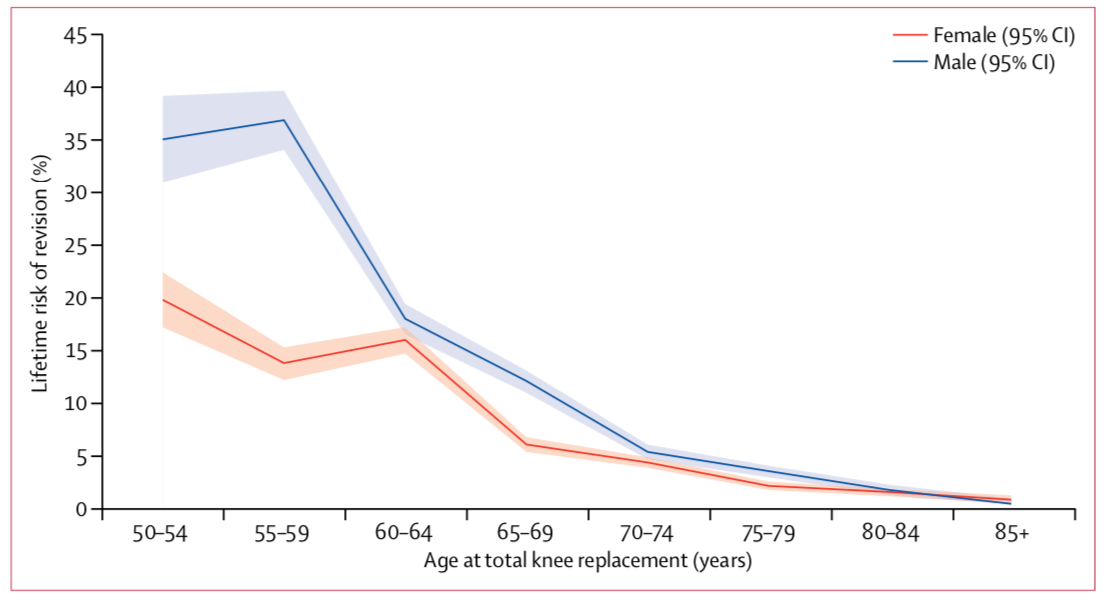Couple walking. Am I too young to get a knee replacement? Image by Monkey Business Images from Canva.com
Total knee replacements can be very effective in improving function and decreasing pain for people with osteoarthritis. Due to advancements in knee replacements they now last on average 5-10 years longer than they used to.[3] People are also getting knee replacements earlier in life. But how early is too early? If you are in your 60s, 50s, 40s, or even 30s, and have knee osteoarthritis, you may be wondering, “Am I too young to get a knee replacement?” This blog will answer that question and provide you with relevant information to help you make the right decision that will maximize your health and quality of life.
Does my age impact how long knee replacements last?
Over 90% of knee replacements last at least 10 years and over 80% of knee replacements last 20 years.[1] For people over 70, there is only a 5% chance that they will need to have another surgery to have their knee replacement revised in their lifetime.[1] A revision is when the knee replacement fails or wears and the surgeon goes back in and replaces all or part of the knee replacement. But what about people younger than 70?
For people under 70, it is much more likely that they will need a revision. About 35% of men and 20% of women between the ages of 50 and 54 who have a knee replacement will require at least one revision in their lifetime.[1] The percentage of people who need a replacement continues to decrease with increased age, and the difference between males and females also disappears with increased age.[1] This is not only because people in their 50s are expected to live longer than people over 70, but also because younger age seems to lead to the replacement lasting a shorter length of time.[6] But this does not mean that people under 70 will not benefit from knee replacements or that they should not get knee replacements; they will still have improvements in the ease of their day-to-day activities and decreased pain as a result of the knee replacement.[6]

Image from Britton-Jones, C. A. (2017). Prehabilitation. British Journal of Hospital Medicine, 78(12), 729-729.
Even with the increased risk of a revision, it is still less than half of people who get a knee replacement between age 50 and 54 that will need a revision. But it is important to note that of these people that need a revision, on average they need this revision within 4.4 years of the initial knee replacement.[1]
You may be thinking, “I’m more likely to need a revision to my knee replacement if I get it replaced at a younger age, so what?” The reason this is important is that these revision surgeries are often more complicated and are not as successful as the initial knee replacement, meaning the improvements in pain and function may not be as significant.[4] The revisions also don’t last as long, meaning that if you need one revision, you may need another.[4]
Does this mean that I should wait to have my knee replaced?
Although getting a knee replacement at a younger age may increase risk of revision, you must also consider the severity of your osteoarthritis when considering if you should wait longer to have your knee replaced. Waiting as long as possible, until the damage in your knee is severe, is not recommended even if you are at a young age.[5] This is because if you wait too long you may not get the same benefit from the surgery. Getting a knee replacement before your osteoarthritis is too severe may lead to a better result; however, this must be balanced with the fact that if it is done too early it may not last as long and a revision may be required.[5]
So, am I too young to have a knee replacement?
Given the information presented, it can be difficult to decide when to have your knee replacement, especially if you are younger than 70. There are a number of factors that go into this decision and it is important to consider that the younger you get your knee replaced, the more likely you are to need a revision, especially if you are a male. But that does not mean that you should wait forever! If you have significant pain and decrease in function as a result of severe knee osteoarthritis, you would benefit from a knee replacement, regardless of how young you are. In this case, if you wait too long, the knee replacement may not be as effective.
If your osteoarthritis is only mild and is not causing significant pain or dysfunction, and you are only in your 30’s, 40s, 50s, or 60s, then it is probably best that you hold off on having your knee replaced. There are other ways to manage your osteoarthritis, such as exercise. Surgery should be reserved for people who have more severe osteoarthritis that is not effectively managed with other treatments, such as exercise and physical therapy.

Exercise is important regardless of the severity of your osteoarthritis and your decision to have your knee replaced, or not. This is because not only can exercise help to treat osteoarthritis, it is recommended that exercise is done before knee replacement surgery. This is called “Prehabilitation” which can help to prevent functional loss immediately following surgery and instill healthy lifestyle changes that can remain after the knee replacement.[2]
Conclusion
When deciding if you should get a knee replacement you need to consider that with a younger age there is a greater risk you will need another operation to revise your knee replacement. You also need to consider that if you wait until your osteoarthritis is too severe, you may not get the same reduction in pain and improvement in function for your everyday activites as with an earlier knee replacement.
If you have severe osteoarthritis and significant pain and difficulty with day-to-day activity, then you are not too young for surgery. If you have only mild pain and difficulty with day-to-day activities then you should wait and try other treatments, such as exercise to manage your osteoarthritis; since having a surgery too early comes with increased risk of having another surgery to revise your knee replacement.
The Curovate mobile app can help you manage your osteoarthritis before and after a knee replacement. It can even help provide you with exercise that will delay your need for a knee replacement.
If you need further customized assistance during your surgery or injury recovery check out our Virtual Physical Therapy page to book your 1-on-1 video session with a physical therapist.
 |
 |
|---|
Other Blogs Related to Joint Replacement
- How long will my knee replacement last? And is there anything I can do to make my knee replacement last longer?
- Should I put off my total knee replacement surgery? Am I waiting too long for my knee replacement? What are my other options?
- Should I exercise before my total knee replacement?
- Why does my knee feel weird after my total knee replacement? Why does my knee feel heavy after my total knee replacement?
- How is my body weight related to the success or failure of my knee replacement or hip replacement? Do I need to lose weight before my hip replacement or knee replacement?
- My surgeon said I have knee osteoarthritis but I don’t have pain - should I get a knee replacement?
- What is a total knee replacement?
- Is it normal to still have pain after a knee replacement surgery?
- What is Osteoarthritis?
- 6 Things You Need to Know After A Total Knee Replacement
- Should I be experiencing pain when I do my rehabilitation exercises?
- Ankle Pumps - Why is my medical team telling me to do these?
- Can I exercise before my ACL surgery - the importance of prehabilitation







